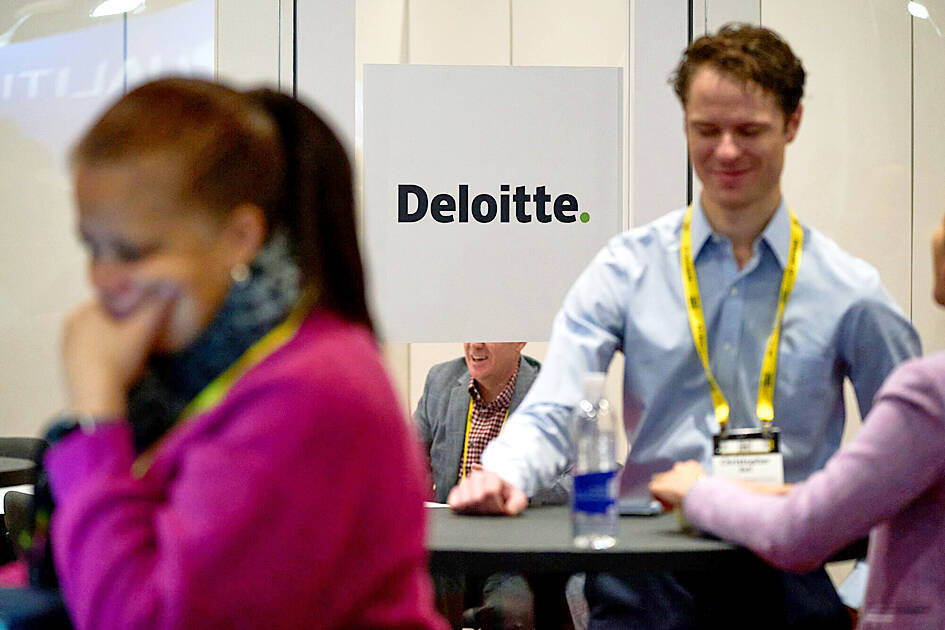The number of initial public offerings (IPO) would pick up this year, driven by high tech and biotechnology firms seeking to grow and upgrade by taking advantage of the local capital market, Deloitte & Touche Taiwan said yesterday.
Deloitte Taiwan’s guarded optimistic outlook came after IPOs last year totaled 45 and together raised a 10-year high of NT$37.9 billion (US$1.213 billion), at odds with a global slowdown amid lingering economic uncertainty and geopolitical tensions.
“The local IPO market has a good chance of flourishing this year, helped by an economic recovery as well as regulatory easing and promotion of the Taiwan Innovation Board, a new platform clustering innovative listings,” Deloitte Taiwan CEO Jason Ke (柯志賢) told a media briefing.

Photo: Bloomberg
Many stock exchanges around the world have lowered listing thresholds to create funding access for innovative companies and Taiwan’s policymakers have rolled out an action plan to achieve similar ends, Ke said.
The number of IPOs could climb to 63 this year, including 24 on the Taiwan Stock Exchange, 24 on the Taipei Exchange and 15 on the Taiwan Innovation Board, the consultancy’s audit and assurance business leader Titan Lee (李東峰) said.
Taiwan is home to the world’s largest suppliers of electronics used in smartphones, high-performance computing, data centers and artificial intelligence (AI) solutions.
The local bourse is attractive in light of regulatory transparency and accountability, procedural ease and competitive underwriting charges, Lee said.
Price-to-earnings ratios in local shares moved up noticeably in the past few years, thanks to the rising importance of Taiwan’s chipmakers on the world stage, government officials said.
The TAIEX last year finished up 26.8 percent with capitalization on the local bourse hitting NT$56.8 trillion and it is expected to reach NT$60 trillion on the back of capital inflows despite weak exports.
Airoha Technology (達發科技), a fabless IC design company and subsidiary of MediaTek Inc (聯發科), the world’s largest 5G smartphone chip designer, raised NT$8.9 billion upon its debut, accounting for a 24 percent share, Deloitte Taiwan said.
Tech firms might continue to dominate the IPO market this year as Taiwanese players command the world’s technology leadership positions and would actively seize business opportunities related to generative AI, Deloitte Taiwan said.
Biotechnology firms would also lend growth momentum in the IPO market, the consultancy said.
Bora Pharmaceuticals (保瑞) and Taidoc Technology Corp (泰博) last year successfully shifted their listing from the Taipei Exchange to the Taiwan Stock Exchange, Deloitte Taiwan said, predicting that peers would launch similar attempts.

MULTIFACETED: A task force has analyzed possible scenarios and created responses to assist domestic industries in dealing with US tariffs, the economics minister said The Executive Yuan is tomorrow to announce countermeasures to US President Donald Trump’s planned reciprocal tariffs, although the details of the plan would not be made public until Monday next week, Minister of Economic Affairs J.W. Kuo (郭智輝) said yesterday. The Cabinet established an economic and trade task force in November last year to deal with US trade and tariff related issues, Kuo told reporters outside the legislature in Taipei. The task force has been analyzing and evaluating all kinds of scenarios to identify suitable responses and determine how best to assist domestic industries in managing the effects of Trump’s tariffs, he

TIGHT-LIPPED: UMC said it had no merger plans at the moment, after Nikkei Asia reported that the firm and GlobalFoundries were considering restarting merger talks United Microelectronics Corp (UMC, 聯電), the world’s No. 4 contract chipmaker, yesterday launched a new US$5 billion 12-inch chip factory in Singapore as part of its latest effort to diversify its manufacturing footprint amid growing geopolitical risks. The new factory, adjacent to UMC’s existing Singapore fab in the Pasir Res Wafer Fab Park, is scheduled to enter volume production next year, utilizing mature 22-nanometer and 28-nanometer process technologies, UMC said in a statement. The company plans to invest US$5 billion during the first phase of the new fab, which would have an installed capacity of 30,000 12-inch wafers per month, it said. The

Taiwan’s official purchasing managers’ index (PMI) last month rose 0.2 percentage points to 54.2, in a second consecutive month of expansion, thanks to front-loading demand intended to avoid potential US tariff hikes, the Chung-Hua Institution for Economic Research (CIER, 中華經濟研究院) said yesterday. While short-term demand appeared robust, uncertainties rose due to US President Donald Trump’s unpredictable trade policy, CIER president Lien Hsien-ming (連賢明) told a news conference in Taipei. Taiwan’s economy this year would be characterized by high-level fluctuations and the volatility would be wilder than most expect, Lien said Demand for electronics, particularly semiconductors, continues to benefit from US technology giants’ effort

‘SWASTICAR’: Tesla CEO Elon Musk’s close association with Donald Trump has prompted opponents to brand him a ‘Nazi’ and resulted in a dramatic drop in sales Demonstrators descended on Tesla Inc dealerships across the US, and in Europe and Canada on Saturday to protest company chief Elon Musk, who has amassed extraordinary power as a top adviser to US President Donald Trump. Waving signs with messages such as “Musk is stealing our money” and “Reclaim our country,” the protests largely took place peacefully following fiery episodes of vandalism on Tesla vehicles, dealerships and other facilities in recent weeks that US officials have denounced as terrorism. Hundreds rallied on Saturday outside the Tesla dealership in Manhattan. Some blasted Musk, the world’s richest man, while others demanded the shuttering of his